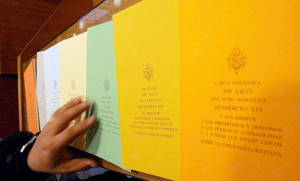There is a nagging, complicated and somewhat technical problem that occasionally springs up when a new papal encyclical is promulgated. All the details of the case need not be rehearsed, but students of Pacem in Terris will recall the unnecessary and misleading questions that arose in 1963 over an alleged lack of fidelity between the so-called official Latin text of Pope John's famous document and its vernacular translations. At the time, there were even hints of some form of foul play with the official text, and the matter became hopelessly confused and controversial before it was dropped by the press.
As we pointed out during the controversy, it was simply false to assume--as was urged to be the case--that the original text of Pacem in Terris was the Latin text. Actually, the document was first written in Italian, then translated into Latin and into other vernacular languages.
Problems are needlessly generated by the fact that the so-caIled "official" or "authentic" version of an encyclical is regarded as the Latin one. Thus, though often not the primary text from the point of view of composition, the Latin is accorded a primacy of honor and made normative. We urge that this custom be changed, by revealing to the public the original language in which an encyclical is composed and by making that text the "authentic" source.
Our most recent encyclical, "On the Development of Peoples," was prepared in French, as the international news services have pointed out. The Latin version, Populorum Progressio, is a marvel of clever work by skiIled translators who have woven the supple language of Cicero into inspired circumlocutions for such contemporary words as "racism," "nationalism:' "the profit motive," etc. Yet for all the prowess of the Roman Latinists and their translations, the results are often very unreal. Thus, if one had nothing but the Latin text before him, would even the best scholar be able to dig through the rich levels of Ciceronian prose and arrive at a translation that would convey all the important nuances of the French original? In one case, which occurs in the important §26, the French word "malheureusement" did not find its place in the Latin translation.
How much better it would be simply to issue the document in the language in which it was first composed, making this the normative and authentic version, and indicating that all others, including the Latin, are derivative.








